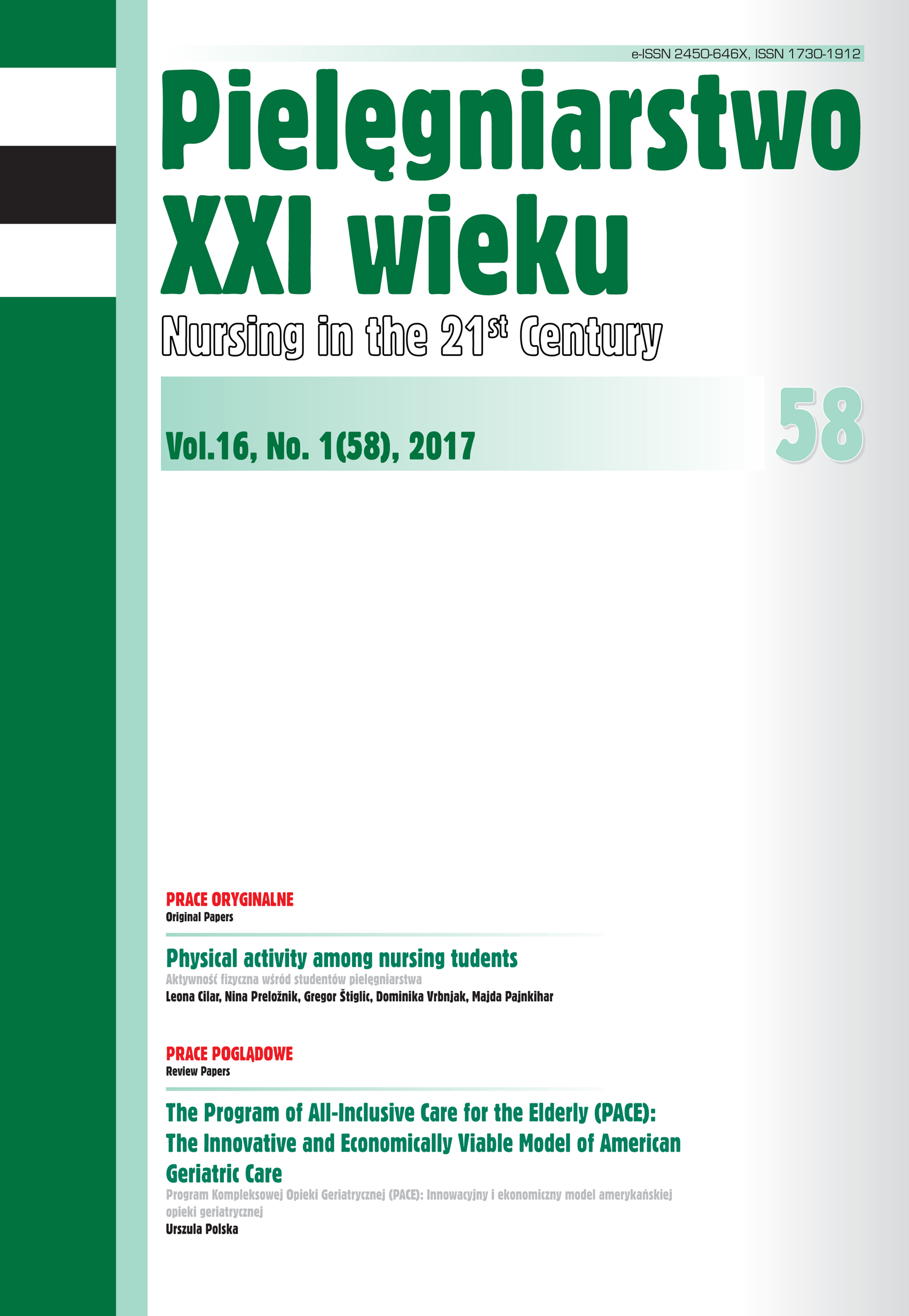Poziom inteligencji emocjonalnej studentów pierwszego stopnia kierunku pielęgniarstwo
DOI:
https://doi.org/10.1515/pielxxiw-2017-0004Słowa kluczowe:
inteligencja emocjonalna, studenci kierunku pielęgniarswo, nauczanie pielęgniarstwaAbstrakt
POZIOM INTELIGENCJI EMOCJONALNEJ STUDENTÓW PIERWSZEGO STOPNIA KIERUNKU PIELĘGNIARSTWO
Cel pracy. Teoria inteligencji emocjonalnej stanowi ramę dla wszelkich pozatechnicznych umiejętności niezbędnych w zawodzie pielęgniarki. Termin ten jest często opisywany jako zdolność wyczuwania, rozpoznawania, zapamiętywania, opisywania, identyfikowania, rozumienia i wyjaśniania emocji. Celem badania było określenie światowego poziomu inteligencji emocjonalnej wśród studentów pierwszego stopnia kierunku pielęgniarstwo, a także sprawdzenie wpływu czynników (rok studiów, rodzaj ukończonej szkoły średniej) na inteligencję emocjonalną.
Materiał i metody. Badanie obejmowało 86 studentów kierunku pielęgniarstwo (średnia wieku 21,7±1,4; 96,5% stanowiły kobiety). Jako narzędzie użyto standardowego kwestionariusza badania Inteligencji Emocjonalnej (IE) – skróconej formy (TEIQue-SF).
Wyniki. Wyniki pokazały wyższy poziom punktowy u studentów kierunku pielęgniarstwo we wszystkich obszarach IE poza Samokontrolą w porównaniu z normą społeczeństwa. Studenci, którzy ukończyli wcześniejszą edukację nie związaną ze zdrowiem, uzyskali wyższy poziom punktowy w obszarze Umiejętności Emocjonalne (p ≤ 0,05).
Wnioski. Cechy IE są niezbędne w zawodzie pielęgniarki zarówno w praktyce edukacyjnej, jak i klicznej. Potrzebne są badania dotyczące roli edukacji i rozwijania cech IE u studentów kierunku pielęgniarstwo, aby potwierdzić wyniki niniejszego badania.
Bibliografia
1. Mayer JD, Salovey P, Caruso DR. A further consideration of the issues of emotional intelligence. Psychol. Inq. 2004; 15: 249-255.
2. Petrides KV, Furnham A. Trait emotional intelligence: Behavioral validations in two studies of emotion, recognition and reactivity to mood induction. European Journal of Personality. 2013; 57(17): 3957. http://doi.org/10.1002/per.466.
3. Schutte NS, Malouff JM, Bobik C, et al. Emotional intelligence and interpersonal relations. J. Soc. Psychol. 2001; 141: 523-536.
4. Bulmer Smith K, Profetto-McGrath J, Cummings GG. Emotional intelligence and nursing: An integrative literature review. Int. J. Nurs. Stud. 2009; 46: 1624-1636.
5. Taylor R, Macduff C, Stephen A A national study of selection processes for student nurses and midwives. Nurse Educ. Today. 2014;34:1155–1160. DOI: http://dx.doi.org/10.1016/j.nedt.2014.04.024.
6. Austin E, Saklofske D, Huang S, Mckenney D. Measurement of trait emotional intelligence: testing and cross-validating a modified version of Schutte et al’s. (1998) measure. Personal. Individ. Differ. 2004;36:555–562. DOI: http://dx.doi.org/10.1016/S0191-8869(03)00114-4.
7. Qualter P, Ireland J, Gardner K. Exploratory and confirmatory factor analysis of the Schutte Self-Report Emotional Intelligence Scale (SSREI) in a sample of male offenders. Br. J. Forensic Pract. 2010; 12: 43–52.
8. Salovey P, Mayer JD. Emotional intelligence. Imagin. Cogn. Pers. 1990; 9: 185-211.
9. Petrides KV, Furnham A. The role of trait emotional intelligence in a gender-specific model of organizational variables. Journal of Applied Social Psychology. 2006; 36(2): 552-569. http://doi.org/10.1111/j.0021-9029.2006.00019.x
10. Petrides KV, Mikolajczak M, Mavroveli S, et al. Developments in trait emotional intelligence research. Emotion Review. 2016; 8(4): 335-341.
11. Szeles HM. Developing emotional intelligence in student nurse leaders: a mixed methodology study. Asia Pac J Oncol Nurs. 2015;2(2):89-98. doi: 10.4103/2347-5625.157575.
12. Petrides KV, Furnham A. The role of trait emotional intelligence in a gender-specific model of organizational variables. Journal of Applied Social Psychology. 2006; 36: 552-569.
13. Cooper A, Petrides KV. A psychometric analysis of the Trait Emotional Intelligence Questionnaire-Short Form (TEIQue-SF) using Item Response Theory. Journal of Personality Assessment. 2010; 92: 449-457.
14. Kaliská LE, Nábělková Psychometrické vlastnosti a slovenské normy Dotazníkov črtovej emocionálnej inteligencie pre deti, adolescentov a dospelých. Banská Bystrica: Belianum; 2015.
15. Adeyemo DA. Emotional intelligence and the relationship between job satisfaction and organizational commitment of employee in public parastatals in Oyo S tate, Nigeria. Pakistan Journal of Social Sciences. 2007; 4: 324-330.
16. Choi Y, Song E, Oh E. Effects of teaching communication skills using a video clip on a smart phone on communication competence and emotional intelligence in nursing students. Archives of Psychiatric Nursing. 2015; 29: 90-95.
17. Oi Sun L, Mee Ock G. Development and effects of emotional intelligence program for undergraduate nursing students: Mixed methods research. Journal of Korean Academy of Nursing. 2014;44: 682-696.
18. Hegge M, Larson V. Stressors and coping strategies of students in accelerated baccalaureate nursing programs. Nurse Educator. 2008; 33: 26-30.
19. Codier E, Kamikawa C, Kooker BM. The impact of emotional intelligence development on nurse managers. Nurs Adm Q. 2011;35:270-276.
20. Nelis D, Quoidbach J, Mikolajczak M, Hansenne M. Increasing emotional intelligence: (How) is it possible? Pers Individ Dif. 2009;47:36-41.
Opublikowane
Numer
Dział
Licencja
Prawa autorskie (c) 2017 Autorzy

Praca jest udostępniana na licencji Creative Commons Attribution-NonCommercial-NoDerivatives 3.0 Unported License.




